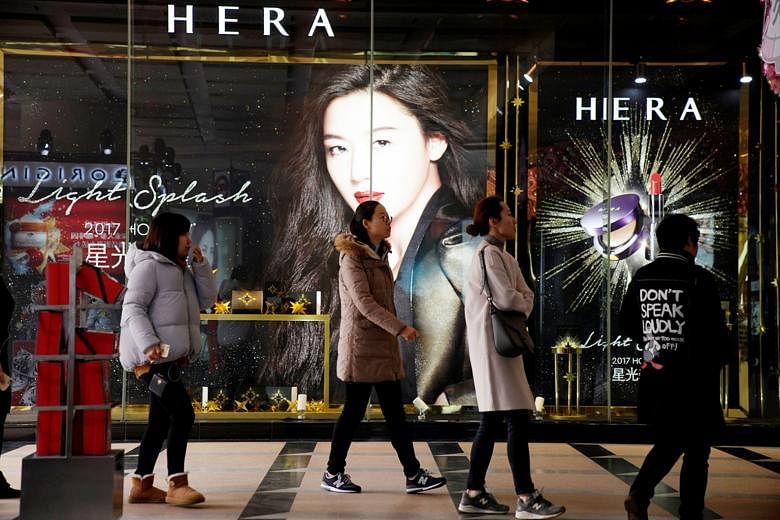WASHINGTON • The mighty force of consumerism has taken hold in China.
This year, retail sales in China are expected to equal or surpass sales in the United States for the first time, another definitive marker in China's rise to economic superpower status.
The growth of China's domestic retail market is luring everyone from carmakers to makeup companies that want to cash in on the country's growing middle class, but it also serves as another complication in United States President Donald Trump's quest to transform US-China trade.
Retail sales in China are on track to hit just over US$5.8 trillion (S$7.7 trillion) this year, according to Japanese bank Mizuho.
It is a stunning rise from a decade ago, when retail sales in China were a quarter of those in the US.
China's rapidly growing middle class has been eager to buy brand-name clothes, cars and mobile phones, among other products. Shanghai is now referred to in fashion circles as "Paris of the East". The spending habits have been supported by higher wages, with China's income per capita jumping from about US$2,000 a year a decade ago, to over US$8,000 a year now.
"China's best bargaining chip is its massive and fast-growing domestic market," said chief China economist Shen Jianguang at Mizuho, who spoke about the retail trend in a recent presentation in the US. "This will change the balance (of power) tremendously, as it is the first time when the US is dealing with a market of equal size in a potential trade war."
On the campaign trail, Mr Trump railed against China as the "economic enemy" of the American people. He harped on the fact that the US buys far more than it sells to China. The US ran a US$310 billion trade deficit with China in 2016.
The two nations continue to dance around each other in a quest for global and economic dominance. Both sides continue to look for leverage over the other.
If Mr Trump really wants to go after China on trade, "we will need leverage and we will need allies", said Mr Olin Wethington, who served as a special envoy to China in 2005 and as an economic adviser to former president George H.W. Bush.
While Mr Trump wants to show his blue-collar base he is being tough on trade, big businesses do not want to see any dramatic actions. More than 20 per cent of sales at companies such as General Motors, Boeing and Apple now come from China, said Mr Shen.
Any restrictions on Chinese access to the US would probably be met with barriers to American firms selling in China.
"China is one of the most important markets for many US multinational companies," Mr Shen said. "This should lend China immense bargaining power."
A record 17.6 million vehicles were sold in the US in 2016, for instance, but that was far below the 24 million passenger cars sold in China. US carmakers account for about one out of every five cars sold in China, even though Beijing places a 10 per cent tax on luxury cars and trucks from the US.
But MIT economist David Autor thinks the US still has substantial leverage in any debate with Chinese President Xi Jinping.
"China exports a substantial piece of its GDP to the United States. They are very dependent on our markets," Mr Autor said. The US currently buys 19 per cent of China's total exports.
One area where there's a lot of agreement across the political spectrum is to go after China's theft of US intellectual property. It is an increasingly important area as the race for global dominance in robotics, biotech and new energy takes off.
Mr Trump has been mulling whether to take action, although he has largely been focused on Chinese steel and aluminium.
WASHINGTON POST

